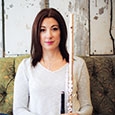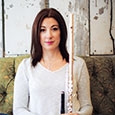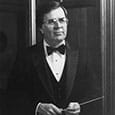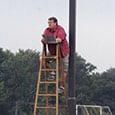Question: How much do you practice?
Answer: I am often asked this question by students, and it is usually accompanied by “how many hours?” I hear the expectation in their voice that I will confirm the idea that more hours equal more success. I remember my friends in college boasting, “I just practiced for four hours!” “Well, I practiced for six!” Practicing the most was like a badge of honor. This seemed strange to me then, and after many years of experience and experimentation, I came to the following realization. Focusing on the amount of practice, as opposed to the quality of practice, is not only futile, but can even be detrimental to your progress.
So, here is the truth. I don’t count. I don’t look at the clock. I don’t require any amount of time from myself or my students. What I do require is short stints of goal-driven, inquisitive, intentional and hyper-focused practice. We have all heard the saying practice smarter, not harder. When I was a student, I thought I was practicing smart. I repeated difficult passages over and over – slowly, with varying rhythms, changing articulation – so something good must have come from that, right? Maybe it did, but ultimately all that work did not stick. Once I began investigating the process by which I learned and my mindset during practice sessions, I realized how much time I was wasting.
We have all experienced the but I could play it perfectly at home syndrome. I used to be that player who was confused as to why in even slightly stressful situations I could not produce the quality of which I knew I was capable. Two things were the impetus for change. First, I began spending loads of money on auditions. If I was paying $1,000 to prove myself in just five minutes, it was time to figure out how to perform consistently. Second, I had a child, and time with my instrument inevitably shrunk. I now had thirty minutes to accomplish what I did in two hours pre-baby, and a funny thing happened – it worked. In fact, it worked better.
I began designing short practice sessions around relearning excerpts in a highly detailed fashion. I insisted upon being patient with myself, trusting that if I practiced thoughtfully and with a diagnostic mindset the first time, then I would feel solid in any situation. I stopped playing through passages just to see if I could or just to fill the time. Instead, I focused on my weaknesses and passages about which I felt uneasy. I addressed the tension in my body through the movements of my fingers, tongue, and air, being careful to not force anything. I worked through technical passages at ridiculously slow tempos, but this time, I paid special attention to even the slightest insecurities that arose. I repeated those areas with a deliberate absence of tension, sort of massaging them out. When something did not work, I questioned my use of support, air speed, air direction, posture, and so forth. I carefully examined the problems and worked through potential solutions. I recorded myself relentlessly. If my mind wandered or I became bored or just felt like I was going through the motions, I stopped.
This all required a great deal of self-reflection, restraint and diligence. By being acutely present, I learned a great deal about myself as a flutist and musician. I cannot adequately express the value in this kind of judicious and efficient practicing. If you are having trouble making your practice stick, consider looking at how you are practicing, not how much. Twenty minutes of prudent practice is equal to sixty minutes of gratuitous playing. More practice does not necessarily equate to more success. Conscious and purposeful practice does. This will not only produce faster results, but longer-lasting results.
If you have a question about playing the flute, send it to us at Ask the Pro: editor@flutetalkmagazine.com






